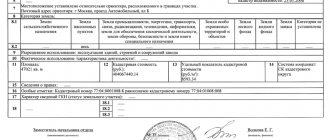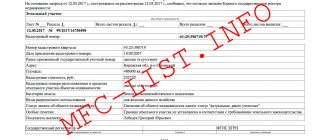According to Federal Law FZ-218, the only confirmation of the termination or emergence of the right to a property is an extract from the Unified State Register of Real Estate.
Consequently, absolutely all real estate data is stored in this database. If you need to find out whether there are encumbrances on a property - a mortgage, pledge or arrest, then you need an Extract from the Unified State Register of Real Estate about the main characteristics and copyright holders of the property.
Extract from the Unified State Register of Real Estate about the property and owners
How to find out about the presence of encumbrances on an apartment, house or land?
If the property is under a mortgage, pledge, or the property has been seized by a court order, then this information must be entered into the Rosreestr database. Thanks to the law that came into force on January 1, 2021, anyone has the opportunity to find out about the presence of registered encumbrances (or their absence) by submitting a request and receiving an Extract from the Unified State Register of Real Estate.
Attention! The validity period of the USRN Extract is not limited by law! But the data contained in it is relevant only as of the date of production of the extract!
The extract has several sections; you can read them in more detail in the article: What sections are there in the Extract from the Unified State Register of Real Estate?
Which section of the Statement contains information about encumbrances?
In order to familiarize yourself with the registered rights and possible encumbrances of the property, you need to study Section 2 of the Extract: Information about registered rights.
In addition to the information that interests us, this section indicates the full name of the copyright holder, the date of origin of the ownership right and the grounds for the emergence of the ownership right, participation in shared construction, etc.
Almost all other “fields” in this section relate to the presence or absence of encumbrances. There are a lot of options for various encumbrances. This could be a mortgage, arrests, pledges, etc.
If we consider the concept of “encumbrance” in the broadest sense, then the Extract from the Unified State Register will not be able to provide you with information:
- On registration of minor children or persons who retain the right to use residential premises upon change of owner
- About the presence or absence of utility debts
- On the consent or disagreement of a spouse to the alienation of an apartment if it was purchased during marriage
Why is this extract needed?
The certificate is an extract from Rosreestr. It indicates whether the citizen owns housing.
Information can be taken from both the regional and federal registers, depending on what information is needed.
to obtain a certificate of lack of housing in the following cases:
- registration as in need of improved housing conditions;
- obtaining a mortgage;
- participation in government programs to provide subsidies for real estate;
- privatization.
The certificate may be required in court when considering disputes related to the division of real estate.
In addition, it must be obtained if an application for assistance from the state is submitted. The document may be required in other individual cases.
What to do if the encumbrances on the property are removed, but they are still in the Unified State Register of Real Estate?
If the seller’s property or yours had encumbrances (pledge, mortgage, etc.) that were recently removed or canceled, and after receiving the Extract, you discovered that they were still registered in Rosreestr, then you should not immediately panic ! This simply may mean that the registrar has not yet had time to enter new information about your property into the Unified State Register of Real Estate.
Important! The law establishes a period of up to 14 working days within which Rosreestr employees are required to make changes to the real estate register.
Therefore, you just need to wait 14-20 calendar days and receive a new statement. If, after this period, the information on your property has not been corrected, you can contact the MFC yourself. In this case, after your request, the registrar will be required to make changes within up to 5 working days, and now, if this is not done, the registrar will personally be held responsible for incorrect information contained in the Unified State Register of Real Estate. You can learn more about the procedure for making changes in the article: How to correct errors in the Unified State Register of Real Estate.
Check the apartment for encumbrances
What to do if there are encumbrances on the property and they have not been removed?
If you are going to purchase an apartment, house or plot, then you definitely need to know about the presence or absence of encumbrances, since, in the event of a dispute, you will be recognized as a bona fide buyer only if due diligence is carried out. If, after receiving the Statement, you see that they exist, then you definitely need to discuss and document your agreements with the seller.
For example, if there is a seizure or pledge, you can enter into a preliminary agreement, which will indicate by what specific date the seller undertakes to remove these restrictions so that you have the opportunity to purchase a legally clear object.
Online contract designer
Of course, you have the right to buy an apartment or house even if there are certain types of encumbrances, but in this case the purchase process will become more complicated, and the acquisition of such real estate will become very risky!
Read more about preparing to buy an apartment in the article: What do you need to know before buying an apartment and how to check it?
Other people's accounts
Paragraph 8 of Article 69 of the Federal Law of October 2, 2007 No. 229-FZ “On Enforcement Proceedings” stipulates that if there is no information about the debtor’s property, then the bailiff requests this information from the tax authorities, other bodies and organizations.
The claimant , if he has a writ of execution with an unexpired deadline for presentation for execution, has the right to apply to the tax authority with an application for the provision of this information.
The claimant can apply for the specified information to any territorial tax authority, including the Federal Tax Service Inspectorate (or the Federal Tax Service) at its location.
When contacting the tax authority with a request to obtain information about the debtor’s accounts, in order to confirm your rights to receive this information, you must simultaneously present the original or a copy of the writ of execution certified in the prescribed manner (by a notary or the court that issued the writ of execution to the collector) with an unexpired deadline for presentation for execution.
If a copy of the writ of execution, certified by an authorized official of the organization that is the recoverer, is submitted to the tax authority, the original of the writ of execution must be presented at the same time.
A properly completed request can be sent by mail (if it is necessary to obtain confirmation of receipt by the addressee - by registered mail with notification), or presented to the tax authority in person (through an authorized representative - by power of attorney).
If the claimant personally presents to the tax authority the original of the writ of execution, the tax authority, after documenting the fact of its existence, returns the original of the writ of execution to the claimant.
In all other cases of sending a request with a copy of the writ of execution attached, certified by an authorized official of the collecting organization, the tax authority will verify the accuracy of the received copy of the writ of execution (by sending a corresponding request to the court that issued this writ of execution).
Tax authorities provide the requested information within 7 days from the date of receipt of the request.
Explanations on this issue, in particular, are given in the Letter of the Ministry of Finance dated November 26, 2008 No. 03-02-07/2-207, as well as in the Letter of the Federal Tax Service No. SA-4-9/ [email protected] dated July 24, 2017.
What kind of certificate is this?
A certificate of absence or availability of real estate is an extract from the Unified State Register of Real Estate, EGRN. Previously, this register was called the Unified State Register, so in some sources you can find a different name for the document: “certificate from the Unified State Register on the absence (presence) of real estate ownership.”
The certificate indicates whether you own real estate. Information about this is taken from the regional register, if information about a specific city (town, village, region) is needed, or from the all-Russian register, when information is needed within the Russian Federation.
Where can I get a certificate of absence of real estate?
Only two organizations issue such documents: the MFC at the place of registration of the applicant’s place of residence and Rosreestr.
To obtain a certificate through the MFC, you need to apply for.
The document can be issued in electronic or paper form. If you need it to apply for assistance from the state, a mortgage, to queue for an apartment, to go to court or to bailiffs, then apply for a paper version. If only for obtaining information, then electronic is also suitable.
Why is the electronic version not suitable for submission to the court or other department? Because there will be no wet stamp or signature of the registrar on it.
You can pick up the completed certificate in person at the branch or request delivery by mail.
To save your time on obtaining a certificate, make an appointment in advance at the MFC: through the website of the same department or through State Services.
Where to apply for a document.
Where to get a certificate of lack of housing depends on the region of residence of the citizen.
There are several organizations that issue the document:
- Rosreestr;
- MFC;
- BTI;
- Government services portal.
However, all cases have their own characteristics. The BTI contains information about real estate registered before 1995.
In some large cities, for example, Moscow and St. Petersburg, it is impossible to obtain a document from this department.
A certificate of lack of housing is not issued through government services .
The citizen will be redirected to the Rosreestr website, where he needs to log in using a confirmed Portal account.
Through MFC.
The fastest and easiest way to prepare a document is to visit the MFC.
The following documents must be provided to the department:
- passport;
- SNILS;
- receipt of payment of state duty.
In some cases, additional documents may be required. For those who changed their last name or other personal data, it is necessary to prepare evidence of this.
If a citizen is married, then a document on entering into a legal relationship may be needed, since the property may be in common ownership.
Documents are submitted in person or through a representative. In the latter case, a power of attorney is required to perform such actions.
For minors or incapacitated citizens, guardians, trustees, and legal representatives receive a certificate.
Writing off a mortgage at the birth of a child: Sberbank, VTB in 2021.
What is the amount of state duty?
The amount of the state duty depends on the number of entities that need to be checked, as well as the form of the certificate. It can be issued in paper or electronic form. In the latter case, the cost of the service is lower.
A citizen will need to pay 650 rubles. for paper and 400 rubles. for the electronic option if you need to find information only in the regional database.
To search for information throughout Russia, you must transfer 1,800 rubles to the state treasury. or 750 rub. respectively.
Price
Both in the MFC and in Rosreestr, the cost of the document is the same:
- for one region in paper form 650 rubles, in electronic form 400;
- for 2-28 regions – paper 1250, electronic 500;
- for the whole of Russia - paper 1800 rub., electronic 750.
You can pay the state duty at any bank or with a card if you order through Rosreestr online. Be sure to keep your payment receipt; without it, your application for a certificate will not be accepted.
If you need legal advice, please contact us via the feedback form. Primary assistance from a specialist is free.










